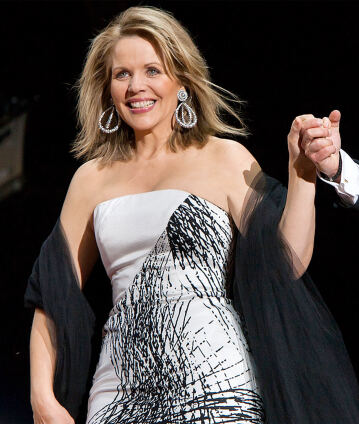A “Night of Love” with Ion Marin and Renée Fleming at the Waldbühne

For this Waldbühne concert, conductor Ion Marin and star soprano Renée Fleming presented a “Night of Love” with opera arias of longing and yearning by Giacomo Puccini, Antonín Dvořák, Erich Wolfgang Korngold and Richard Strauss. Plus there are orchestral classics such as Mussorgsky’s dark and terrifying Night on the Bald Mountain and Tchaikovsky’s early masterpiece Romeo and Juliet.
Before setting off on their annual summer leave, the Berliner Philharmoniker traditionally give their final concert of the season at the city’s open-air Waldbühne. In 2010, the conductor was Romanian-born Ion Marin, who now lives in Austria, and the soloist was the American soprano Renée Fleming.
The evening began with Mussorgsky’s Night on the Bald Mountain, a piece that tells of a far from balmy summer’s evening: according to Russian folklore witches meet for their annual Sabbath on St John’s Eve towards the end of June. Mussorgsky’s tone poem paints a picture of their wild cavorting in colours that glow like red-hot coals. As if seeking to tame these turbulent spirits, Renée Fleming then sang Dvořák’s “Song to the Moon”, an aria that seems to shimmer in the moonlight. After that, an instrumental love duet from Khachaturian’s ballet Spartacus provided a transition to the Countess’s closing monologue from Richard Strauss’s last opera, Capriccio, a signature role for Renée Fleming, a singer who is in demand all over the world as a Strauss soprano.
The programme continued with Wagner’s Rienzi overture, before Fleming sang Marietta’s Lied from Korngold’s Die tote Stadt with “beguiling melodiousness” (Berliner Zeitung). A particular treat was the juxtaposition of two settings of La Bohème that revealed how Leoncavallo’s Mimì is a substantially more robust character than Puccini’s. The official programme ended with Tchaikovsky’s languorous fantasy overture Romeo and Juliet about arguably the most famous pair of lovers of all time. The first encore was by Gregoriaş Dinicu, allowing Ion Marin to pay homage to his Romanian homeland, after which Renée Fleming sang Puccini’s wistful aria “O mio babbino caro”, demonstrating once again how much she feels at home on the Waldbühne stage: “It’s a wonderful place. When you’re standing there on the stage, you feel that your singing could soar up to the heavens themselves.”
© 2010 EuroArts Music International
Category
Artists
Our recommendations
- Seiji Ozawa conducts a Gershwin Night at the Waldbühne
- Andris Nelsons conducts Tchaikovsky at the Waldbühne
- Simon Rattle conducts Beethoven and Mendelssohn at the Waldbühne
- Simon Rattle and Katia and Marielle Labèque at the Berlin Waldbühne
- Gustavo Dudamel conducts Tchaikovsky and Brahms at the Waldbühne
- “World Encores” with Mariss Jansons and Vadim Repin at the Waldbühne